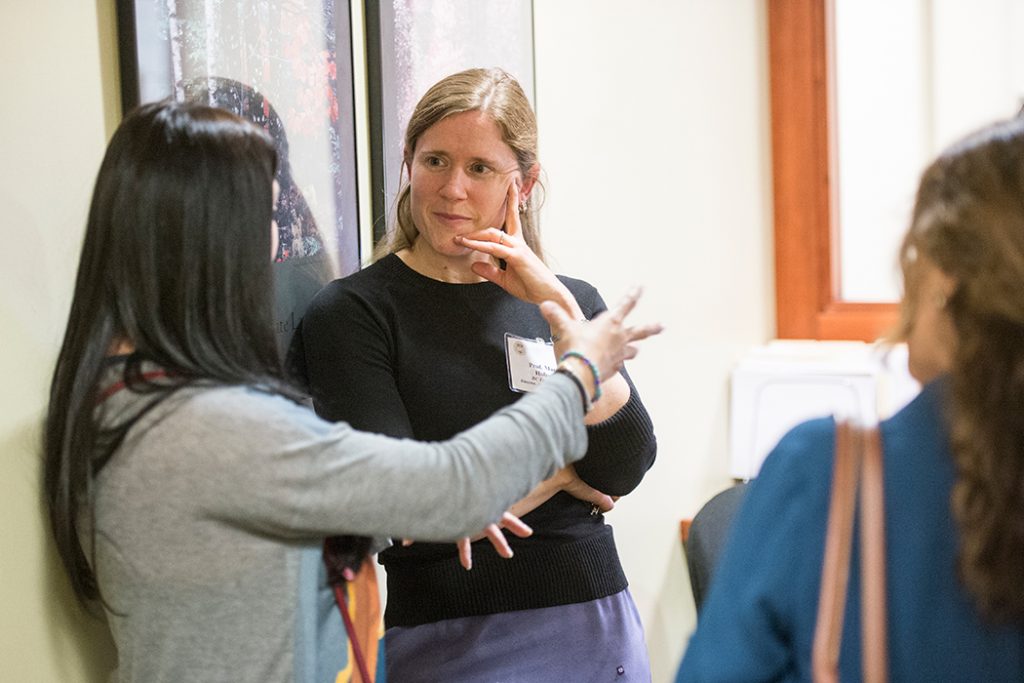Boston College Law School did not disappoint Heather Perez ’17. When picking law schools, she exclusively applied to those with strong immigration law programs. Much to her satisfaction, BC Law’s reputation for success in this practice area, she says, “turned out to be true.”
“Personally disgusted” by the way immigrants are treated in this country, Perez enrolled in the Immigration Clinic her 2L year. The experience enabled her to successfully argue at her client’s deportation hearing. The empowering win was the result of a team effort; Perez worked with Karla Vergara’17 and Frances Ha ’17 of the Immigration Clinic as well as Kelsey Craig ’17 of the Juvenile Rights Advocacy Project to secure the fair hearing of a young man in Texas scared to go back to his country.
The victory was just one in a string of successes BC’s immigration law program has seen this year, including several reasonable outcomes at bond hearings.
The Immigration Clinic is one of eight clinics housed in the Center for Experiential Learning, which gathered all of BC Law’s clinical programs under one roof in the fall of 2014.
According to Brian Quinn, associate dean for experiential learning, law school administration envisioned a center that could model real-world firm life. “We wanted to create an atmosphere where students could all work as a single firm,” said Quinn. “Now, each of the clinics has access to the resources of the firm.”
Included among those resources is the chance for, as Quinn puts it, “valuable spontaneous interactions” among students within different practice areas. Professor Mary Holper (pictured above, with student), who runs the Immigration Clinic, has made deliberate efforts to spark these interactions for her students.
In addition to encouraging the cross-collaboration between the Juvenile Rights Advocacy Project and the Immigration Clinic, in recent years Holper has invited a student from the Boston College Graduate School of Social Work to complete a yearlong field placement with the clinic.
This year’s social work student, Nanci Fiore-Chettiar, strengthened the law students’ experience and success by providing “an extra set of hands, eyes, and ears and the perspective of someone not trained in the law,” said Holper. “Having a social work student helps law students approach very difficult subject matters during client interviews, broach the topic of traumatic experience, and assist in effective investigation and fact development.”
This interdisciplinary relationship, now in its third year, further helped Holper’s 10 clinical students digest and make sense of crucial medical and psychological evaluations of their clients. “[Fiore-Chettiar] was in a much better place to do it than we would be,” Holper said.
Quinn noted the impressive development going on within the center and said that he is “proud of the energy level and the idea that there’s so much more we can do.”
The number of students enrolled in these clinical programs speaks to the growing interest among students in centralized, hands-on legal work. The Immigration Clinic this year took in 10 law students, an increase from previous years, and further welcomed the addition of an alumna, Beth Zilberman ’13, as a clinic fellow.
Holper thoughtfully organizes the clinic’s caseload based on the professional desires and passions of each student, meeting with them individually to determine the type of cases they are interested in. She wants the work to inspire them “to get out of bed in the morning,” she said.
She focuses on providing her students with a strong sense of ownership, calling it a “frontline failure” if she were to step in and take over. “It’s so fun to watch them really own an issue and talk about it and educate their peers about it because it shows them how much they learned,” she said.
Perez described her admiration for Holper’s leadership style throughout the clinic experience. “We create our own meeting agendas and guide the conversation we have with her,” said Perez. “This is not a clinic where they tell you what to do. It’s driven by students but guided by professors…who are well-respected and connected to the immigration law community in Boston.”


